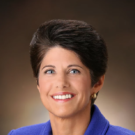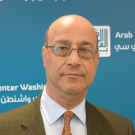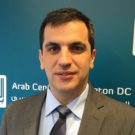Speakers

Leslie Touma
Executive Director
American Task Force for Lebanon
Moderator

Reema Abuhamdieh
Presenter and Reporter
Al Araby Television Network
Event Summary
On December 10, 2019, Arab Center Washington DC (ACW) organized a panel at the National Press Club titled “Lebanon’s Protests and Prospects for Change.” The panel consisted of Imad K. Harb, Director of Research at ACW; Patricia Karam, Regional Director of the Middle East North Africa Division at the International Republican Institute; and Leslie Touma, Executive Director of the American Task Force for Lebanon. Reema Abuhamdieh, a reporter for Al Araby Television Network, served as the panel moderator.
Khalil Jahshan, ACW Executive Director, welcomed the audience and offered some comments about the ongoing revolution in Lebanon, saying that it is not new or surprising if one looks at the modern history of upheavals in the country. He argued that the intensity of this particular revolution is different, however; it is the product of the failure of the elites in charge of Lebanese politics and economics to deliver for their citizens. The power-sharing, “consensual politics” form of governance, he added, has stopped working, and the high level of corruption—as a result of the competition for state resources—has divided the people by sect, each vying to get their share. He described the protesters as generally nonsectarian and nationalist, looking to establish a modern Lebanese state based on secular principles. Indeed, their central demand is to dismantle the political system itself.
Reema Abuhamdieh agreed that the protesters are illustrating the non-sectarian nature of a unified Lebanon. She said that their demands also contribute to the many challenges facing the country, especially that of being a locus of proxy wars. The basic political power-sharing model, she explained, invites external interference. She asked, will the protests continue for some time? And along with the challenges, do they also present some opportunities as well?
Imad K. Harb said that Lebanon is undergoing a revolution and not simply an uprising, one that will be sustainable as long as people continue to demonstrate in the streets. However, they are facing an old, established leadership and a confessional system which he likened to the Ottoman millet system. The government has decided to dig in its heels even though the protesters have made it clear that it no longer represents the new generation of Lebanese citizens. Harb said this has shaken the representational politics of the country’s leadership—the president, prime minister, and speaker of parliament—as based on sects. Despite this system’s entrenchment, he argued that it is hard to see the continuation of this arrangement because such a patronage system has led to rampant corruption. It is time for the Lebanese to address these deep-seated problems and make the hard choices to move forward. The current politics of national unity cabinets has resulted in the absence of a political opposition that can make the government accountable The economic system, he added, is no longer sustainable since it is based on services and banking, with hardly any industry or agriculture to speak of. The banking sector, in particular, has profited from government loans and high interest rates, making the Lebanese pound lose its value on a daily basis. Seeing corruption as endemic in all political and bureaucratic circles, the protesters want the old political class to disappear and a technocratic provisional government to supervise national elections according to a new electoral law. “The street has spoken,” he reiterated.
Patricia Karam described the current situation in Lebanon as a watershed moment in Lebanese politics, one that is heralding the emergence of a new political consciousness. The established elite thought it could wait the protesters out to defuse and shatter the protests, but grassroots politics have prevailed so far. She noted that the Taif Agreement of 1989 enshrined sectarianism in Lebanon, and this led to the proliferation of kleptocracy in the government. As for the economy, Karam said that Lebanese banks have been reaping huge interest rates against the background of a high public debt, a situation she described as unsustainable. Moreover, as the Lebanese eke out a basic livelihood, they face salary cuts, a devaluation of the Lebanese pound, and a country defaulting on its debt. What is certain, Karam continued, is that the revolution will not succeed without addressing the issue of Hezbollah, which she said has buttressed the kleptocratic system. Whereas, until recently, Hezbollah leader Hassan Nasrallah was seen as above corruption, this is no longer the case, especially when he insisted that the Lebanese government should not step down as a result of the protests. In general, she noted, Hezbollah “diluted its brand” and lost its reputation as a resistance group after it sent soldiers to fight in the Syrian civil war. Regarding the future of the protests and the country, Karam said this will be a test of protester resilience. She considered the possibility of militancy and violence but said the more likely scenario is the formation of a party that reflects the demands of the protesters.
Leslie Touma addressed US policy toward Lebanon and said that the Trump Administration—like the ones before it—views a strong and prosperous Lebanon as in the best interests of the United States. She pointed to the bipartisan US-Lebanon Friendship Caucus, which has been very involved with congressional delegations to Lebanon and has played an important role in nurturing expanded knowledge of the country on Capitol Hill. Members of Congress view the Lebanese Armed Forces as a “very professional,” credible, and non-corrupt organization, one that is the “glue” that is keeping the country together. This motivates Congress to keep allocating security and humanitarian aid to the country. However, Touma argued that although the United States and the international community should not abandon Lebanon at this volatile time, the Lebanese should take charge of the current political and economic situation and institute reform themselves. She said the United States should have a targeted, surgical approach in terms of sanctions on Hezbollah. The main challenge in Lebanon, she concluded, is the collapsing economy, and this has dire consequences on every sector in the country—in short, the economic situation and how it is handled will be what drives reform in Lebanon.
Event Photos



